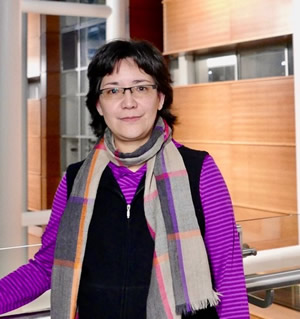By Hamza Taufique
 Dr. Christine S. Chow is a Professor in the Department of Chemistry at Wayne State University in Detroit, Michigan. She carried out her PhD research in the area of inorganic chemistry with Professor Jackie Barton at the California Institute of Technology. These studies sparked her initial interest in RNA modifications, a theme that continues in her lab. “I was working on developing inorganic complexes that target specific tertiary structures of RNA,” she explained, “and when we moved on to look at mutant tRNAs that lacked modified nucleotides, we noticed that they had altered structures. This eventually led to my interest in the roles of modifications in larger RNAs such as the ribosome.”
Dr. Christine S. Chow is a Professor in the Department of Chemistry at Wayne State University in Detroit, Michigan. She carried out her PhD research in the area of inorganic chemistry with Professor Jackie Barton at the California Institute of Technology. These studies sparked her initial interest in RNA modifications, a theme that continues in her lab. “I was working on developing inorganic complexes that target specific tertiary structures of RNA,” she explained, “and when we moved on to look at mutant tRNAs that lacked modified nucleotides, we noticed that they had altered structures. This eventually led to my interest in the roles of modifications in larger RNAs such as the ribosome.”
After completing a post-doctoral fellowship with Dr. Stephen J. Lippard (at MIT, Cambridge, MA), Dr. Chow started her own lab in 1994 with the goal of elucidating the structural and functional roles of modified RNA nucleosides. Today, a major part of Dr. Chow’s work also involves RNA therapeutics. “Our RNA targeting studies began in the early ‘90s,” she said, “with work on developing assays to monitor RNA-ligand interactions. At that time, one of my colleagues was studying antibiotic resistance, and so we collaborated to test aminoglycoside analogues in our newly developed assay.” Recent discoveries in this area have led to the identification of several short peptides targeting rRNA at regions important for ribosome function. She continued, “We are now working on modifying these peptides for better cell penetration and using in vivo selection to screen peptide libraries for enhanced activity. We believe this approach is much faster than chemical synthesis and testing derivatives in vitro.”
“One of the greatest challenges that still exists in science and academia is bias”
In addition to recognition for her research contributions, Dr. Chow has received accolades for her teaching and graduate student mentorship. She has trained over 100 undergraduate and 50 graduate students, almost all of whom were first-generation students. Dr. Chow has also been involved with the REBUILDetroit program, which provides training and research opportunities to undergraduate students from underrepresented groups. One important facet of this program is the training for faculty members, where they hone mentorship skills and learn about implicit bias. “One of the greatest challenges that still exists in science and academia is bias,” she explained. “We all need to learn to recognize bias, including our own biases, and to change our behavior so that our labs are inclusive.”
Dr. Chow’s mentoring approach has been shaped by her own training experiences. When she was a graduate student, she was told that “I would become the expert on my project, and that my goal should be to teach my advisor something new. Dr. Chow reflected, “This advice gave me confidence and inspired me to take ownership of my project.” Dr. Chow now tells the same thing to her students, but with a twist: “My instruction to students is to work hard and stay curious. They should not be afraid to move into new areas and to continually challenge themselves.”
Dr. Chow has been a member of the RNA Society since 1994, and always enjoys the “lively poster sessions” at the annual meeting. Her favorite memory comes from meeting Dr. Olke Uhlenbeck when she was an assistant professor. “Although we had collaborated when I was a graduate student and published a paper together, we had never met. It was at an RNA Society meeting in Madison that we first met—we ran into each other at a coffee break, and it was like meeting a rock star!”
Dr. Chow’s favorite RNA is the hammerhead ribozyme, and she continues to have her undergraduate biochemistry students synthesize it in her lab class. You can find Dr. Chow on Twitter at @chrstysc.
